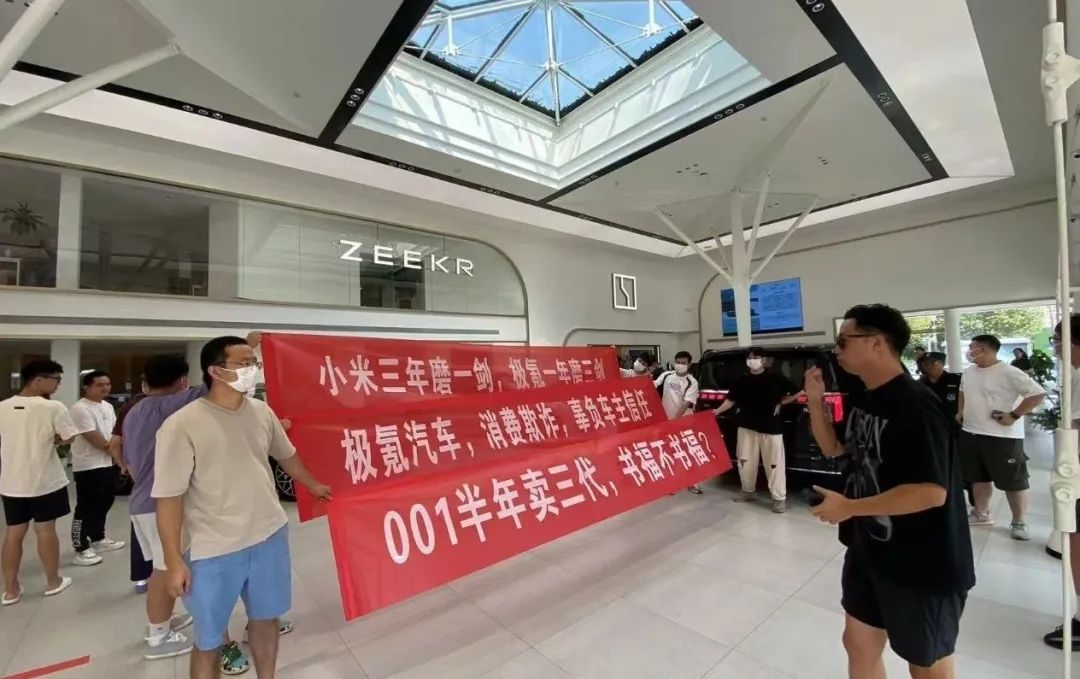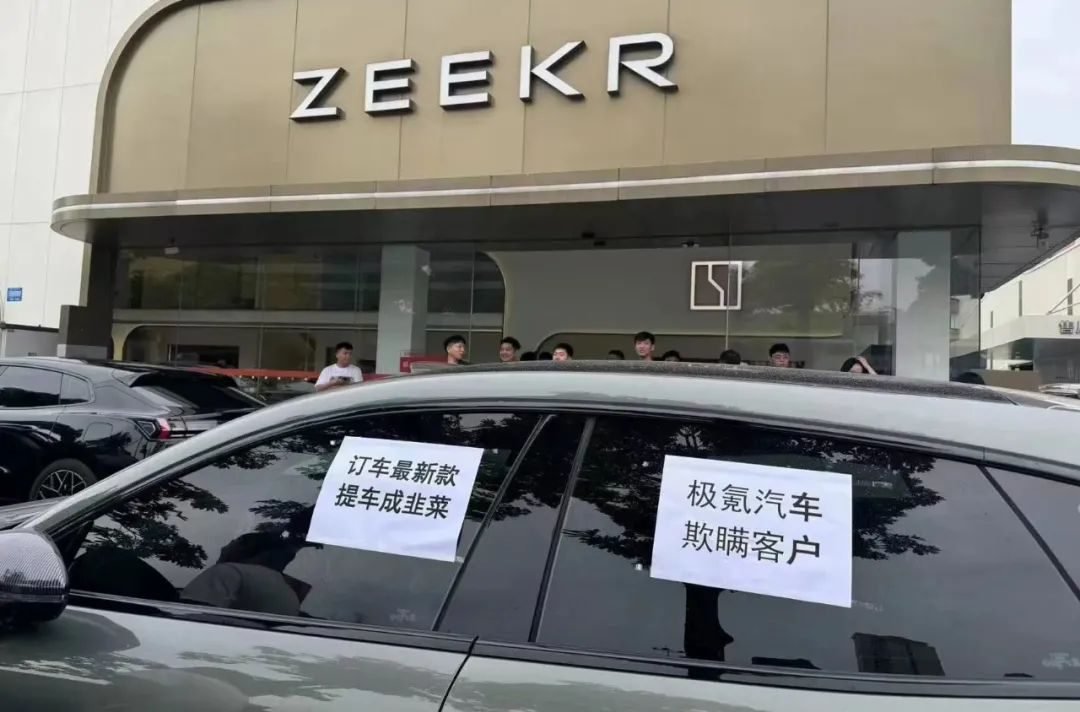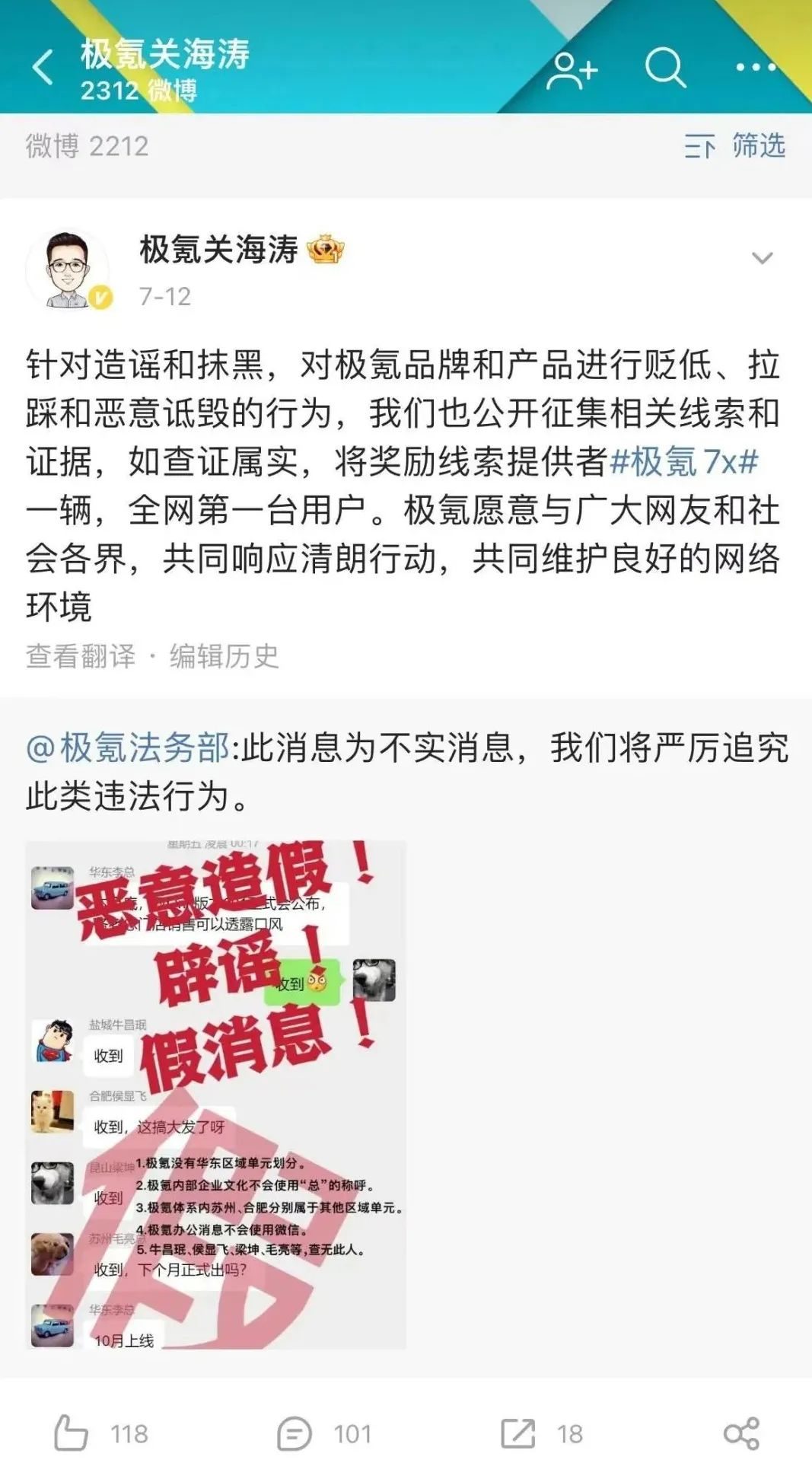Car owners are finally not in debt to Zeekr anymore
![]() 08/16 2024
08/16 2024
![]() 612
612
Author: Rustless Bowl
It's hard to imagine that amidst the lingering afterglow of the Olympics and ongoing international turmoil, a car company would manage to break through the noise and dominate social media trends.
On August 13, Zeekr officially announced its new products – the 2025 Zeekr 001 and 2025 Zeekr 007 through a prerecorded press conference.
Despite the seemingly generous offer of 'upgraded configurations at a lower price,' the anticipated surge in orders and accolades did not materialize. Instead, long-time customers, fueled by anger, became regular visitors to Zeekr dealerships.
Due to Zeekr's frequent model changes, upgrades, and price reductions, many customers found themselves owning 'old' models shortly after purchasing their cars. One unlucky owner had their car become outdated by two generations just six months after buying it.
In addition to the differences in configurations and prices between new and old models, the decrease in resale value of older models has also caused direct financial losses for these car owners. Over the past two days, angry car owners have gathered at dealerships across the country, demanding answers from Zeekr.
In several widely circulated videos and photos on social media, the ingenuity of these long-time Zeekr owners is enviable, as evidenced by this banner:
'Xiaomi sharpens one sword in three years, Zeekr sharpens three swords in one year.'

In response to these memes and rumors, Zeekr has taken a confrontational approach – by reporting them to the police. On August 14, Zeekr's legal department issued a statement stating that the company has gathered evidence of organized rumors and Photoshopped images on online platforms and will hold all perpetrators accountable under the law.
When new energy vehicles first gained popularity, industry influencers predicted that their upgrade cycle would be significantly faster than that of traditional gasoline vehicles, which typically see a generation change every four years and a facelift every two years.
'Compared to gasoline vehicles, electric vehicles are more akin to intelligent devices like smartphones.'
However, no one could have anticipated that Zeekr, as a car company, would set a record for faster generation changes than even smartphones.
Zeekr's two flagship models, the 001 and 007, have undergone three generation changes in just six months.
The ancient Greek philosopher Heraclitus once said, 'No man ever steps in the same river twice,' but this does not apply to Zeekr owners, who can purchase the 2023, 2024, and 2025 models of the Zeekr 001 within the same year.
In response to this, Zeekr's CEO An Conghui provided two explanations during a post-press conference interview:
• Market trends and pressures necessitated accelerated generation changes
• The development of Zeekr's self-developed autonomous driving technology surpassed expectations, leading to an earlier launch
Objectively speaking, An's explanation is grounded in reality. In the fiercely competitive new energy vehicle market, autonomous driving technology has become the cornerstone of a brand's sales and long-term prospects. Companies like BYD, XPeng, NIO, and even Lixiang, which reacted slightly slower, are all all-in on autonomous driving.
There are also rumors that NIO has successfully taped out its self-developed autonomous driving chip at a cost of 4 billion yuan.
In contrast, Zeekr's response time has been unusually slow. In the context where companies like Tesla, NVIDIA, and Huawei are pushing autonomous driving chip computing power into the 'hundreds' and 'thousands' of TOPS, the 2024 Zeekr 001, which underwent a generation change earlier this year, still utilizes two Mobileye EyeQ5H chips with a combined computing power of only 48 TOPS.
In contrast, the newly upgraded 2025 001 features mostly similar hardware in terms of motors, batteries, and smart cockpits as its predecessor. The primary difference lies in the integration of Zeekr's self-developed HaoHao AD 2.0 solution, which, powered by dual NVIDIA Orin-X chips, boasts a computing power of 508 TOPS, on par with industry standards.
Despite the objective facts, An's explanation failed to win over long-time car owners. In interviews with relevant media, car owners refuted Zeekr's official stance point by point.
For instance, according to An's explanation, Zeekr suddenly realized the demand for self-developed autonomous driving technology after the launch of the 2024 001, prompting the expedited development of the 2025 001.
However, attentive customers have noticed that the Zeekr 007, delivered starting in December last year, already featured NVIDIA's Orin chips, whereas the newer 2024 001, released two months later, still utilized the relatively outdated Mobileye chips. This suggests that the 2024 001 may have been a 'transitional model' from the start.
In the comments section, a seasoned Zeekr owner commented on the rapid generation changes:
'Car owners are essentially footing the bill for Zeekr's failures in autonomous driving.'
Furthermore, beyond the direct financial losses, emotional distress has been a key factor contributing to car owners' mental imbalance and collective advocacy efforts.

For example, in a previous Q&A session, Zeekr explicitly denied offering paid upgrades to the HaoHao AD solution for owners of older Zeekr 001 models.
Moreover, a series of questionable actions by Zeekr executives and sales teams have further strained relationships with customers.
Similar to Tesla owners protesting price cuts, consumers are not opposed to price reductions per se but rather the infringement of their 'right to know.' They resent automakers' tactics of using new models to boost sales while clearing old inventory at full price.
Rumors of an upcoming generation change and upgrade to Zeekr's self-developed autonomous driving system for the 001 model began circulating earlier this year, all of which were denied by Zeekr.
Just a month ago, Zeekr's Chief Marketing Officer Guan Haitao publicly dismissed rumors of an end-of-month model change as 'fake news' and offered a Zeekr car as a reward for information leading to the source of the rumors.

Subsequent developments validated the rigor of Zeekr's executive team – the new model change occurred in early August, not late July, as rumored.
A woman who had picked up her car less than a week prior complained to the media that she had repeatedly confirmed with sales staff before making her purchase that there would be no imminent model change.
Similar breakdowns of trust have occurred repeatedly among Zeekr owners who purchased their cars in the past six months.
In response, Zeekr offered a humorous, yet somewhat ironic, apology:
'We understand the importance of trust. Therefore, we are offering a special car purchase voucher worth 10,000 yuan to our long-time customers.'
This prompted an equally humorous reaction from many car owners:
'Not only do I not receive compensation for my financial losses, but I'm also encouraged to buy more from Zeekr?'
Many recall An's high-profile promises over the past two years, such as Zeekr's commitment to pursuing a high-end luxury route despite the challenges.
Looking back, it is evident that Zeekr has much work to do in terms of fulfilling its responsibilities, enhancing the customer experience, and providing satisfactory customer service, all of which are crucial for a high-end luxury brand.
Throughout Zeekr's three-and-a-half-year journey, incidents such as quality complaints, irregular model changes, and concealed information have been commonplace. At one point, there were almost as many Zeekr advocacy groups as there were owner groups.
In October 2021, Zeekr's first batch of car owners wrote a joint letter complaining about discrepancies between the ordered and delivered optional components.
In December 2022, sales staff at some Zeekr dealerships were accused of concealing information about upcoming model changes, leading customers to lock in orders and take delivery of outdated models.
In August 2023 and February 2024, Zeekr received numerous complaints from car owners who claimed they were misled into placing orders just before major model changes and promotional activities.
In response to these complaints, Zeekr has often been vague and evasive. Following the recent model change, several Zeekr executives even enabled 'comment filtering' on their social media accounts.
In other contexts, however, the brand is portrayed as a customer-centric 'conscientious automaker,' exemplified by its self-funded expenditure of 300 million yuan in July 2022 to upgrade Qualcomm 8155 cockpit chips for free for a group of car owners.
This heartwarming story from two years ago still circulates in many articles related to Zeekr.
Upon checking Zeekr's sales data, we found that the company sold a total of 15,655 cars in July this year. Based on depreciation and configuration differences after the model change, assuming an average loss of 20,000 yuan per car, the total loss for car owners who have had their cars for just over a month would amount to approximately 300 million yuan.
To those who haven't been blocked by Zeekr executives, we suggest asking:
'Car owners have already paid back their debt to Zeekr. Can you please give us a heads-up next time there's a model change?'







